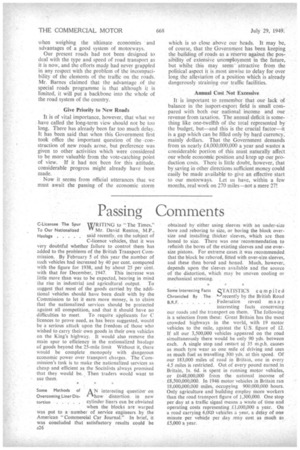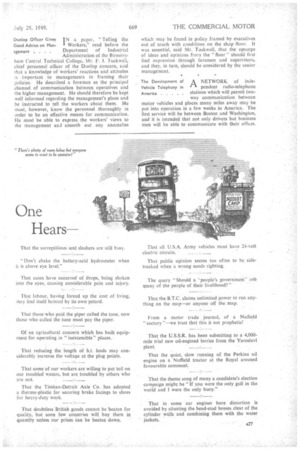Passing Comments
Page 2

Page 3

If you've noticed an error in this article please click here to report it so we can fix it.
C-Licensee The Spur WRITING to "The Times,"
To Our Nationalized TY Mr. David Renton, M.P.,
Haulage said recently, on the subject of C-licence vehicles, that it was very doubtful whether failure to control them has added to the problems of the British Transport Commission. By February 5 of this year the number of such vehicles had increased by 40 per cent, compared with the figure for 1938, and by about 25 per cent, with that for December, 1947. This increase was little more than was to be expected, bearing in mind the rise in industrial and agricultural output. To suggest that most of the goods carried by the additional vehicles should have been dealt with by the Commission to let it earn more money, is to claim that the nationalized services should be protected against all competition, and that it should have no
difficulties to meet. To require applicants for C licences to prove need, as has been suggested, would be a serious attack upon the freedom of those who wished to carry their own goods in their own vehicles on the King's highway. It would also remove the main spur to efficiency in the nationalized haulage of goods beyond the 25-mile limit Without it, there would be complete monopoly with dangerous economic power over transport charges. The Cornmission's task is to make the nationalized services as cheap and efficient as the Socialists always promised that they would be. Then traders would want to use them.
Some Methods of A N interesting question.' on Overcoming.LinerDis"how distortion in new
tortlon cylinder liners can be obviated
when the blocks are warped was put to a number of service engineers by the American "Commercial Car Journal." In brief, it was concluded that satisfactory results could be a26 obtained by either using sleeves with an under-size bore and reboring to size, or boring the block oversize and installing thicker sleeves, which are then honed to size. There was one recommendation to refinish the bores of the existing sleeves and use oversize pistons. For extreme cases it was recommended that the block be rebored, fitted with over-size sleeves, and these then bored and honed. Much, however, depends .upon the sleeves available and the source of the distortion, which may be uneven cooling or mechanical stressing.
Some Interesting Facts STATISTICS compi I.e d Chronicled By The "recently by the British Road B.R.F. Federation reveal many interesting facts concerning our roads and the transport on them. The following is a selection from these: Great Britain has the most crowded highways in the world, with 19 motor vehicles to the mile, against the U.S. figure of 12. If all our 3,500,000 vehicles appeared on the road simultaneously there would be only 90 yds. between each. A single stop and restart at 35 m.p.h, causes as much tyre wear as one mile of driving and uses as much fuel as travelling 300 yds. at this speed. Of our 183,000 miles of road in Britain, one in every 4.5 miles is restricted. Out of every pound =media Britain, Is. 6d. is spent in running motor vehicles, or £648,000,000 from the national income of £8,500,000,000. In 1946 motor vehicles in Britain ran 18,000,000,000 miles, occupying 900,000,000 hours. Only agriculture and building employ more workers than the road transport figure of 1,300,000. One stop per day at a traffic signal means a waste of time and operating costs representing,EI,000,000 a year. On a road carrying 6,00.0 vehicles a year, a delay of one minute per vehicle per clay may cost as much as .
£5,000 a year. Dunlop Officer Gives IN a paper, " Telling the Good Advice on ManWorkers," read before the
agement . . . Department of Industrial Administration of the Birmingham Central Technical College, Mr. F. I. Tuckwell, chief personnel officer of the Dunlop concern, said that a knowledge of workers' reactions and attitudes is important to managements in framing their policies. He described a foreman as the principal channel of communication between operatives and the higher management. He should therefore be kept well informed regarding the management's plans and be instructed to tell the workers about them. He must, however, know the personnel thoroughly in order to be an effective means for communication. He must be able to express the workers' views to the management and smooth out any anomalies Which may be found in policy framed by executives out of touch with conditions on the shop floor. It was essential, said Mr. Tuckwell, that the upsurge of ideas and opinions trona the "floor" should first find expression through foremen and supervisors, and they, in turn, should be considered by the senior management.
The Development of A NETWORK of inde Vehicle Telephony in pendent radio-telephone America stations which will permit two
way communication between motor vehicles and places many miles away may be put into operation in a few weeks in America. The first service will be between Boston and Washington, and it is intended that not only drivers but business men will be able to communicate with their offices.


























